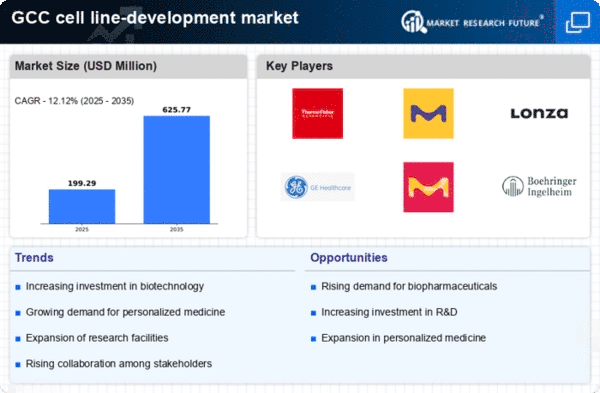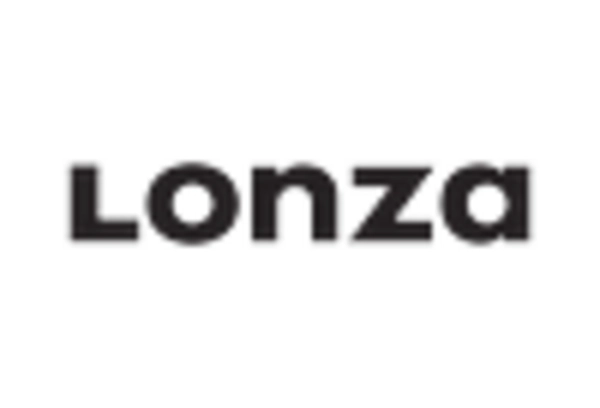Regulatory Framework Enhancements
The cell line-development market is benefiting from enhancements in the regulatory framework within the GCC. Governments are increasingly recognizing the importance of biopharmaceuticals and are implementing policies that support the growth of the biotechnology sector. Streamlined regulatory processes and incentives for research and development are likely to encourage investment in cell line development. In 2025, the GCC is expected to introduce new guidelines that facilitate faster approval times for biopharmaceutical products, thereby accelerating the market's growth. This supportive regulatory environment is crucial for fostering innovation and ensuring that new therapies reach the market more efficiently. As a result, stakeholders in the cell line-development market are likely to experience increased opportunities for collaboration and expansion, ultimately contributing to the overall growth of the biotechnology landscape in the region.
Rising Prevalence of Chronic Diseases
The cell line-development market is significantly influenced by the rising prevalence of chronic diseases in the GCC region. As healthcare systems grapple with the increasing burden of conditions such as diabetes, cancer, and cardiovascular diseases, there is a heightened demand for innovative therapeutic solutions. The market for biopharmaceuticals, which heavily relies on cell line development, is expected to witness substantial growth, with estimates suggesting a value of over $5 billion by 2026. This trend underscores the necessity for advanced cell line technologies that can facilitate the rapid development of effective treatments. Additionally, the GCC's focus on improving healthcare infrastructure and access to advanced therapies is likely to further propel the cell line-development market, as stakeholders seek to address the growing health challenges faced by the population.
Increasing Investment in Biotechnology
The cell line-development market is experiencing a surge in investment from both public and private sectors within the GCC. This influx of capital is primarily directed towards research and development initiatives aimed at enhancing biopharmaceutical production capabilities. In 2025, the biotechnology sector in the GCC is projected to grow at a CAGR of approximately 10%, indicating a robust interest in innovative solutions. This financial backing is crucial for the advancement of cell line-development technologies, enabling companies to develop more efficient and cost-effective production processes. Furthermore, the establishment of biotechnology parks and incubators in the region is likely to foster collaboration among stakeholders, thereby accelerating the growth of the cell line-development market. As a result, the market is poised for significant expansion, driven by the increasing availability of resources and funding for biotechnology ventures.
Growing Demand for Personalized Medicine
The cell line-development market is witnessing a growing demand for personalized medicine, which is reshaping the landscape of therapeutic development in the GCC. As healthcare providers increasingly recognize the importance of tailoring treatments to individual patient profiles, the need for specific cell lines that can mimic patient responses becomes paramount. This trend is likely to drive investments in the development of customized cell lines, which are essential for the creation of targeted therapies. The market for personalized medicine is projected to reach approximately $3 billion by 2027 in the GCC, indicating a substantial opportunity for companies specializing in cell line development. Furthermore, collaborations between research institutions and pharmaceutical companies are expected to intensify, facilitating the exchange of knowledge and resources necessary for advancing personalized medicine initiatives.
Technological Advancements in Cell Line Development
Technological advancements are playing a pivotal role in shaping the cell line-development market. Innovations such as CRISPR gene editing, high-throughput screening, and automated cell culture systems are enhancing the efficiency and precision of cell line development processes. These technologies enable researchers to create more robust and stable cell lines, which are essential for biopharmaceutical production. In the GCC, the adoption of these advanced technologies is expected to increase, driven by the need for faster and more reliable production methods. As a result, the market is likely to expand, with companies investing in state-of-the-art facilities and equipment to stay competitive. The integration of artificial intelligence and machine learning in cell line development processes may also emerge as a trend, further optimizing production and reducing time-to-market for new therapies.
















